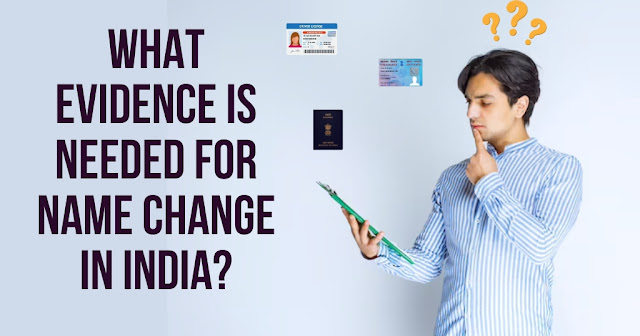What evidence is needed for name change in India?
Understanding the Legal Framework for Name Change in India
Before delving into the evidence required for a name change, it is essential to have a basic understanding of the legal framework governing name changes in India. The primary legislation pertaining to name changes is the Indian Name Change Act, 1973. However, the specific procedures and requirements may vary slightly across different states and union territories. It is advisable to consult the local district court or seek legal counsel for accurate information pertaining to your jurisdiction.
Common Scenarios Requiring Name Change Evidence
Marriage:
When a person gets married and wishes to change their name, they need to provide a marriage certificate or a marriage registration document issued by the competent authority. The marriage certificate serves as evidence of the name change, allowing individuals to update their identity documents such as passport, Aadhaar card, PAN card, and others.
Divorce:
In the case of divorce, an individual can revert to their pre-marriage name or adopt a new name altogether. To change their name after divorce, they need to submit a copy of the divorce decree or order issued by the court as evidence of the name change. This document will help in updating various legal and official records.
Religious Conversion:
If an individual undergoes a religious conversion and wishes to change their name accordingly, they may need to provide a conversion certificate issued by a competent authority or a religious organization. This certificate serves as evidence of the name change and can be used to update official documents and records.
Personal Preference:
Sometimes, individuals may wish to change their name due to personal reasons or to align with their gender identity. In such cases, supporting evidence might include an affidavit or a deed poll, a notarized document stating the individual's intention to change their name. Additional documentation, such as a newspaper advertisement announcing the name change, might be required in certain states or jurisdictions.
Additional Documentation and Procedure
Apart from the specific evidence required for each scenario mentioned above, there are a few additional documents that are generally required when applying for a name change in India. These may include:
Identity Proof:
Documents such as Aadhaar card, PAN card, voter ID card, or passport, which serve as proof of the applicant's identity.
Address Proof:
Documents like utility bills, ration card, driving license, or rental agreement to establish the applicant's current address.
Affidavit:
An affidavit stating the applicant's intention to change their name, duly notarized by a notary public.
The exact procedure for name change applications may vary based on the jurisdiction. Typically, it involves submitting the necessary documents along with the prescribed application form to the local district court or the designated authority. The applicant may need to appear in person for verification or attend court hearings, depending on the requirements of the concerned authority.
Conclusion:
Changing one's name in India requires providing specific evidence to support the name change request. Whether it is due to marriage, divorce, religious conversion, or personal preference, having the appropriate documentation is crucial. Understanding the legal framework, gathering the necessary evidence, and following the prescribed procedures will help individuals navigate the name change process smoothly. It is advisable to seek legal guidance and consult the local authorities to ensure compliance with the specific requirements of your jurisdiction. Remember,
Written by Neelam



